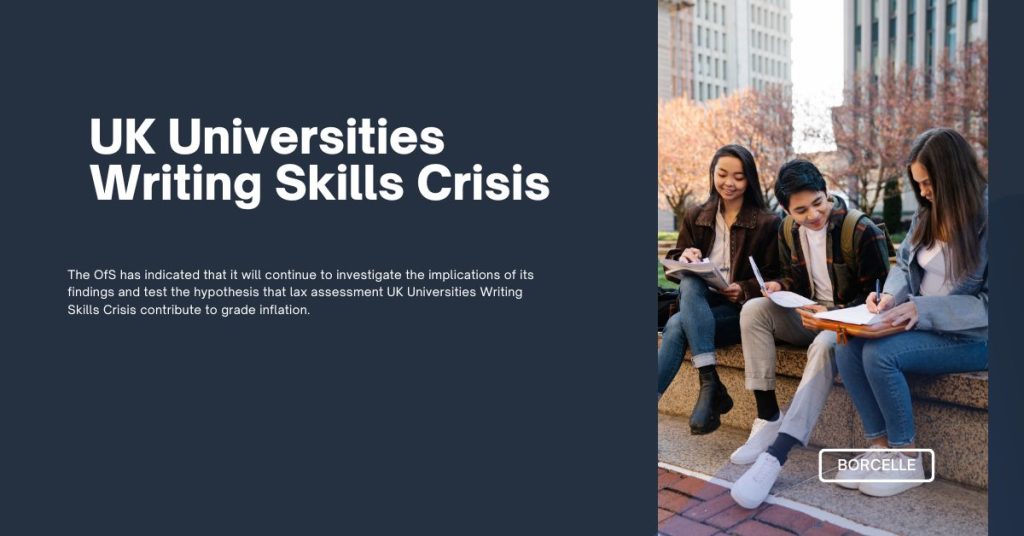In recent developments, UK Universities Writing Skills Crisis regulator, the Office for Students (OfS), has issued a stark warning about universities and colleges not penalizing students for poor spelling, grammar, and punctuation. This oversight is reportedly contributing to grade inflation and undermining academic rigor. The OfS's review highlights a troubling trend where a misguided application of equalities legislation allows institutions to ignore errors in students' written work. This leniency, the regulator asserts, is widespread and could signal a broader issue within the sector.
Background and Review Findings
The UK Universities Writing Skills Crisis focused on assessment policies from five higher education institutions. It found a common theme of leniency regarding language accuracy, driven by interpretations of the Equality Act and similar legislation. This leniency results in poor spelling, punctuation, and grammar not being assessed or even explicitly disregarded in some cases. According to Susan Lapworth, the OfS’s director of regulation, this practice may be indicative of a sector-wide issue where writing proficiency is not adequately evaluated.

Lapworth criticized the approach, emphasizing that effective assessment should encompass all aspects of a student’s work, including their ability to communicate effectively and correctly in written English. The UK Universities Writing Skills Crisis involved analyzing assessed student work across various modules and disciplines, scrutinizing marking criteria, and reviewing staff comments. This thorough examination revealed that in several cases, universities justified the omission of written proficiency assessment based on an overextension of equality legislation.
Implications of Ignoring Writing Standards
The OfS’s report raises significant concerns about how neglecting language accuracy could contribute to unexplained grade inflation. If poor writing skills are not being assessed, it allows students to potentially achieve higher grades than their proficiency would warrant. This, the UK Universities Writing Skills Crisis compromises the integrity of academic assessments and may lead to a distorted representation of students' abilities and achievements.
In response, the UK Universities Writing Skills Crisis has warned that it is prepared to take regulatory action against universities failing to address these concerns. The regulator is advocating for a return to rigorous assessment practices that include evaluating spelling, punctuation, and grammar for most students and courses. The goal is to ensure that assessment standards remain high and that academic qualifications accurately reflect students' capabilities.
Responses and Criticisms
The OfS’s review has not been without controversy. UK Universities Writing Skills Crisis argue that the review’s scope—focused on only five institutions—may not accurately represent practices across the entire sector, which includes over 400 registered institutions. Universities UK, representing more than 140 mainstream higher education institutions, contends that while universities acknowledge the importance of English language proficiency, the review’s findings do not necessarily reflect a widespread issue.
Universities UK asserts that its members are committed to assessing a range of skills and knowledge, including language proficiency. The organization suggests that the OfS’s conclusions might be based on a narrow sample and may not be indicative of broader practices.
Michelle Donelan, UK Universities Writing Skills Crisis minister, has voiced support for the OfS’s stance, underscoring the government’s commitment to improving university standards. She supports the regulator's efforts to hold institutions accountable for maintaining high standards in written English.
Moving Forward
The OfS has indicated that it will continue to investigate the implications of its findings and test the hypothesis that lax assessment UK Universities Writing Skills Crisis contribute to grade inflation. This ongoing scrutiny aims to ensure that universities uphold rigorous standards and provide students with a quality education that translates into reliable academic outcomes.
OfS’s review underscores a critical issue in higher education—one where the balance between inclusivity and academic rigor is at stake. By addressing the concerns raised, universities can strive to maintain high standards of assessment that reflect students' true capabilities, ultimately safeguarding the credibility of academic qualifications and the integrity of the education system.
Comments (0)